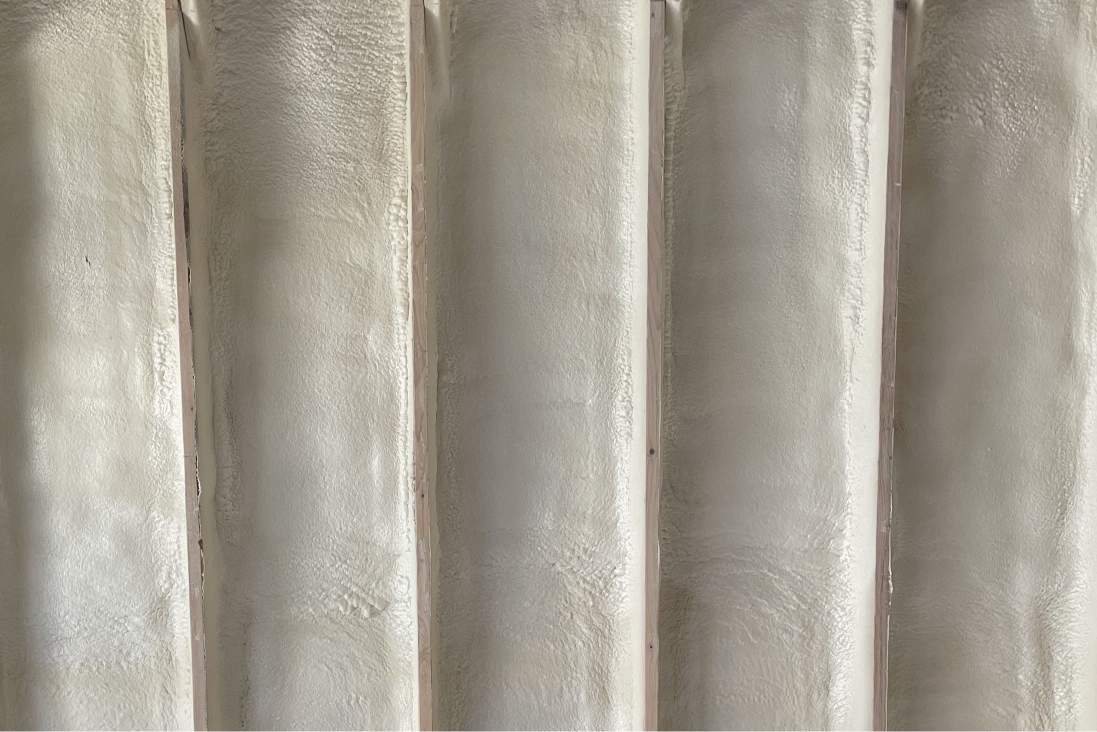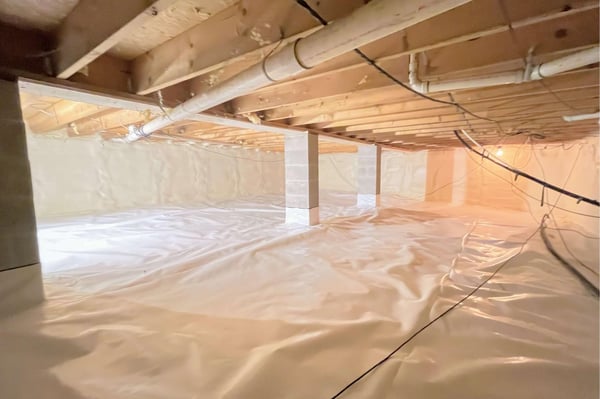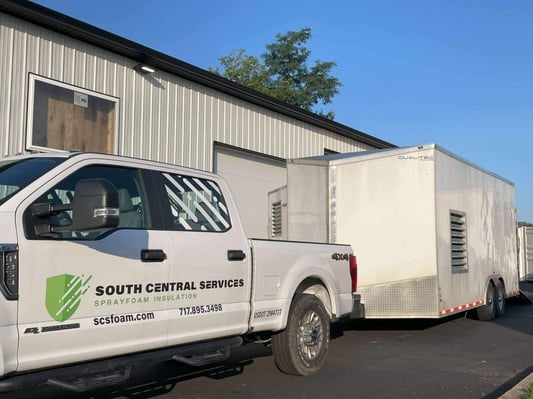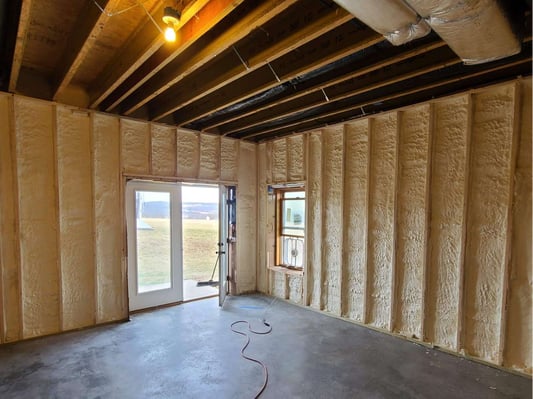
You’ve learned that there are two types of spray foam insulation to choose from. But how will you know if closed cell spray foam is best for your project?
South Central Services has installed open and closed cell spray foam insulation for hundreds of projects in and around Greencastle, PA. Our job is to help customers decide which spray foam is best for their needs.
By the end of this article, you will know:
- The features of closed cell spray foam
- Any drawbacks of closed cell spray foam
- Where closed cell spray foam is best installed
- What problems closed cell spray foam can and cannot solve
Don't have time to read right now? Check out everything you need to know at a glance.
What’s Closed Cell Spray Foam Again?
Closed cell spray foam insulation is one of two types of spray polyurethane foam. Closed cell gets its name from its tight cell structure. That cell structure creates a rigid foam with many features and benefits, which we will explore in this article.
Pros Of Closed Cell Spray Foam
Closed cell spray foam has a long list of benefits. The features of closed cell give it versatile applications. Here’s a preview of the pros of closed cell spray foam.
- Structural enhancement
- Below-grade capabilities
- Vapor barrier
- Air barrier
- Versatility
- High performance
Let’s look at each of these benefits in more detail.
1. Closed Cell Improves Racking Strength.
Closed cell spray foam is a higher-density foam, which makes it more rigid. This rigidity allows closed cell foam to support structures already in place through something called racking strength.
In a building, walls are usually the primary structural component. If a structure ever gets out of alignment, it is referred to as racking. To prevent racking, walls benefit from a good racking strength. Closed cell foam can increase racking strength by up to 200%.
2. Closed Cell Has Below-Grade Capabilities.
If you want spray foam installed in your basement or crawl space, closed cell spray foam is the product you need. Closed cell spray foam is approved for below-grade applications because of its density, rigidity, and potential for a vapor barrier. By comparison, open cell spray foam cannot be installed below-grade.
 Homeowners often insulate their basements and crawl spaces to improve energy efficiency in their homes. These spaces are only sometimes finished or considered living spaces. Without insulation, any heating or cooling efforts directed towards these spaces are wasted energy. Insulating basement walls can support your HVAC system, so the natural cool temperature below ground will not interfere with the temperature of the living space.
Homeowners often insulate their basements and crawl spaces to improve energy efficiency in their homes. These spaces are only sometimes finished or considered living spaces. Without insulation, any heating or cooling efforts directed towards these spaces are wasted energy. Insulating basement walls can support your HVAC system, so the natural cool temperature below ground will not interfere with the temperature of the living space.
If you'd like to calculate the potential price of insulating your basement, use our guide to the cost of closed cell spray foam in basements.
3. Closed Cell Can Create A Vapor Barrier.
At a depth of approximately 1.5 inches, closed cell spray foam becomes a vapor barrier. A vapor barrier prevents the moisture in the air from entering a wall, roof, or ceiling assembly. Without a vapor barrier, the vapor in the air could pose a risk to the structure.
For below-grade applications, vapor barriers are ideal. A vapor barrier can protect below-grade masonry walls like concrete or stone since the air has more moisture.
Vapor barriers are also ideal for applications against metal or in roofing systems.
Most insulation products cannot become or create a vapor barrier. Open cell spray foam requires additional coatings for vapor retardation. Fiberglass batts have paper facings to create vapor barriers. However, these facings rarely perform in real-world applications due to installation errors or gaps.
In our service area, vapor barriers are a necessary part of the insulation conversation. Homes in southern Pennsylvania, Maryland, Virginia, and West Virginia fall into Climate Zone 5. This climate zone has distinct seasonal weather patterns that often necessitate vapor barriers.
4. Closed Cell Offers Air Barrier Capabilities.
At a depth of 1 inch, closed cell spray foam becomes an air barrier. An air barrier creates an airtight seal, preventing air leakage. Air leakage contributes to energy inefficiency, discomfort, and poor air quality. Air that leaks is uncontrolled, which means it can bring unwanted heat and outdoor air pollutants unchecked.
Most insulation products do not air-seal. Traditional insulations are expected to prevent conduction heat. Closed cell spray foam prevents heat transfer by conduction, convection, and radiation. Heat in the leaking air cannot radiate or circulate by air-sealing with closed cell spray foam.
5. Closed Cell Is Versatile.
Closed cell spray foam is one of the most versatile insulation products. Not only can closed cell be installed below-grade in basements and crawl spaces, but it can also be installed above-grade in exterior walls, roofs, and attics.
6. Closed Cell Offers High Performance.
Closed cell spray foam is a high-performing insulation product by every measure. The traditional measure of insulation performance is R-value or resistance value. R-value measures a material’s resistance to heat transfer by conduction. The higher the R-value, the better a material resists that heat transfer. Closed cell spray foam insulation has an R-value of approximately R-7 per inch.
What R-value doesn’t measure is resisting heat transfer through radiation or convection. Any uncontrolled heat transfer can influence comfort and energy efficiency in a home. Air-sealing can prevent heat transfer through radiation and convection.
Air-sealing prevents heat transfer and outdoor air pollution from affecting indoor air quality. Through all these features, closed cell spray foam can improve indoor air quality, comfort, and energy efficiency.
Cons Of Closed Cell Spray Foam
Despite the many benefits of closed cell spray foam, this product has some drawbacks. Here’s a preview.
- Cost
- Soundproofing
- Installation requirements
Let’s examine each of these in more detail.
1. Closed Cell Is More Expensive.
Closed cell spray foam is one of the most expensive insulation products. As a premium product with numerous benefits, closed cell spray foam tends to be more expensive.
Closed cell spray foam is also more expensive than open cell spray foam. Open cell spray foam has a higher yield between the two types of foam. A higher yield means more open cell spray foam than closed cell spray foam can be installed for the same amount of raw materials.
2. Closed Cell Is Not A Soundproofing Insulation.
Closed cell spray foam will provide some degree of sound attenuation. However, closed cell is not designed to offer soundproofing benefits. The closed cell structure that creates rigidity and a vapor barrier cannot trap soundwaves like other insulation products.
If your goal is soundproofing, you are looking for a different product than closed cell spray foam. Or, you may need a hybrid system that uses both closed cell and another product to collectively achieve both sound attenuation and thermal performance.
Examples of other insulations that could be used individually or in tandem with closed cell include open cell spray foam, rockwool, dense pack cellulose, or cotton batting. Some combination of these insulation types may provide the soundproofing you need.
You may want to contact a soundproofing professional for their expertise on your space and its requirements for soundproofing.
3. Closed Cell Must Be Installed By A Professional.
You may see do-it-yourself kits available for spray foam insulation. We cannot recommend these as an insulation solution. While you may save money on installation costs, the likelihood of error is high. Spray foam is a product created by a chemical reaction requiring precision and control. DIY kits cannot provide precision or control and will not result in a product with the above benefits.
 A professional contractor must install any spray polyurethane foam, including closed cell. Hiring a professional will incur additional costs besides the raw materials. However, by hiring a competent spray foam contractor, your insulation is insured and should be effective.
A professional contractor must install any spray polyurethane foam, including closed cell. Hiring a professional will incur additional costs besides the raw materials. However, by hiring a competent spray foam contractor, your insulation is insured and should be effective.
For an in-depth comparison of professionally installed spray foam and DIY kits, check out our article comparing DIY and professional spray foam.
Where Closed Cell Is Best To Install
Closed cell spray foam is a versatile product that can be installed nearly anywhere. Typical applications for closed cell include basements, crawl spaces, exterior walls, attics, and roofs.

Closed cell will be an effective insulation product for attics and exterior walls. However, with other options like open cell spray foam, there may be more cost-effective options for these applications than closed cell.
Problems Closed Cell Can And Can’t Solve
The number one problem that closed cell spray foam can solve is air leakage. Closed cell spray foam creates an airtight seal, which creates a more comfortable and energy-efficient living environment. Air-sealing with closed cell spray foam will also improve indoor air quality.
Another problem that closed cell spray foam may solve are condensation issues in walls or roofs. Whether closed cell can unilaterally solve these issues will vary case-by-case. However, as a product that can create a vapor barrier, there is potential for closed cell spray foam to solve this kind of problem on its own.
Having a vapor barrier is not the same thing as being flood-proof. Closed cell spray foam is not a waterproofing solution. For below-grade applications that struggle with flooding, closed cell spray foam will not stop or prevent flooding.
The Bottom Line About Closed Cell Spray Foam Insulation
Closed cell spray foam can be installed almost anywhere, providing benefits like improved air quality, increased comfort, and energy savings. Closed cell spray foam has the most built-in benefits and versatility of any insulation product.
At the same time, closed cell foam is an expensive investment that requires hiring a professional insulation contractor. South Central Services is a professional contractor servicing areas near Chambersburg, Pennsylvania. Homeowners outside of our service area must find and evaluate other spray foam contractors.
Closed cell spray foam may be the best product depending on your budget and project. Or, closed cell may be a pricey option that delivers more than you need.
Now that you know the pros and cons of closed cell, your next step is to:
- Discover the pros and cons of open cell spray foam
- Learn when you can use two inches of closed cell
- Estimate the cost of closed cell for your basement
- Compare the cost of open cell and closed cell spray foam
Disclaimer: While we strive to publish information accurate to building science, local building codes and standards supersede our recommendations.
Kilian has co-owned and operated South Central Services for 8 years. He is passionate about community involvement. In his spare time, he enjoys being with his family, playing ice hockey, and going fishing with friends.
Topics:


